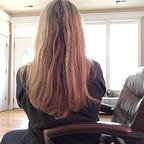My Southern Childhood Was Bathed in the Toxic Atmosphere of Racism:
The Effects were Sometimes Lethal
The first time racism reared its ugly head in my childhood world was when the girl next door told me we couldn’t play with Nina, the little girl across the street, because she was a “dirty Jew.” I was a year younger than the girl next door and tended to let her boss me around, but I liked Nina, who insisted with tears in her eyes that she wasn’t a Jew.
I had no idea what a Jew was and why it was such a bad thing, so I asked my mother, who sighed with exasperation. For one thing, my mother said, Nina was Lebanese, not Jewish. For another, there was absolutely nothing wrong with being a Jew; our country had been in a war just a few years earlier to try to save Jews from persecution and death at the hands of Nazis.
Over the next few years, my mother methodically educated me about the horrors of the concentration camps. She’d known a number of young Jewish refugees at the college where she’d taught, and she sometimes played the organ at the nearby Jewish Temple when their organist was unavailable. Perhaps I was a little young for those gruesome stories, but my mother wanted me to fully understand the ramifications of hatred.
Over the next few years I learned that Jews weren’t the only group subjected to disgust and ridicule. People who had dark skin were called a name that I wasn’t allowed to say in my house. The only time I used that word in my mother’s presence was probably the only time I ever experienced her wrath. At the time, I didn’t know there was something wrong with the word. However, I soon learned how laden with hatred and disdain it was. I also heard it directed at my family by those who accused us of being N-word lovers.
Growing up, I heard over and over again the “jokes.” I never found them funny. Perhaps I could have objected to them, but I was a child and the racism was so pervasive I didn’t even realize you could oject. Fish don’t rebuke the water for being cold. We used to ride our bikes behind the mosquito-spray truck, laughing as we lost ourselves in the smelly fog. We had no idea we were breathing poison.
I was in the eighth grade when my babysitter, one of my step-father’s high school chorus students, called us up with “good news.” When I answered the phone, she said with breathless excitement that Martin Luther King Jr. had just been killed. I turned to my mother and told her the news. I didn’t know who this man King was, but my mother did. She snatched the receiver from my hand and slammed it down. Then she went into the living room and took her grief to her piano. The girl never babysat for me again.
The south was the scene of violence and rage in those days. For a while it was unsafe for anybody to go out at night because of riots, and so I didn’t get to see the Beach Boys when they came to town. This seemed so unjust to me. I didn’t realize that Black people were fighting for their very lives. Then my mother told me about a motel owner in nearby St. Augustine who put acid in the motel swimming pool rather than let Black people swim in it. Missing the Beach Boys, she seemed to be telling me, was a minor concern.
In my mid-teens I went to live for a year with my older brother in the Midwest. My brother and his wife were steeped in the ethos of the late 60s — peace, love, and rainbows. They kept a poster on the wall of a black baby and a white baby playing together. For the first time I attended an integrated school. And although the white kids and the black kids kept their distance, I no longer heard the “jokes” or the constant derogatory remarks. Racism still existed but it wasn’t lingering on every lip. The very air felt lighter. Jimi Hendrix was our idol.
When I went back to Florida for my last two years of high school at — you guessed it — Robert E. Lee High School, I hung out with the pot-smoking, love and acceptance clique. But the poison had already taken effect. Soon many members of my cohort, including me, abandoned marijuana for heroin in an act of collective self-destruction.
We lived in a deeply racist and sexist country, a country which had embarked on a war where it was okay to call human beings “gooks” and slaughter them without mercy. We lived in a world where a woman who was raped “probably asked for it.” The self-destruction of a portion of a generation makes perfect sense to me in that context.
I did manage to get clean — thanks to my mom, who always believed in love. But I was one of the lucky ones. Many of my friends from that era did not survive. They were often the sensitive, smart ones. They died of drug overdoses or drunk driving accidents or they wound up in prison for years. I believe breathing in that toxic air of hatred and intolerance helped to kill them. It wasn’t the only reason, for sure, but it was definitely a contributing factor.
I don’t know what it’s like to be a black person or an oppressed minority in this country. I only know that hatred is a poison, and when it’s in the air, it can’t be contained. It hurts everyone.
